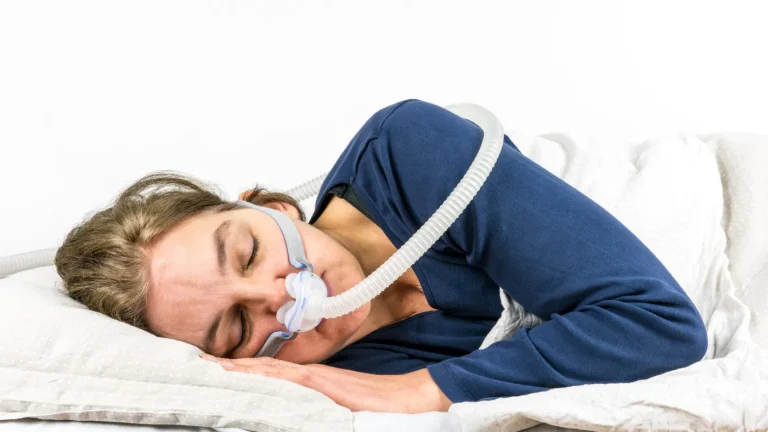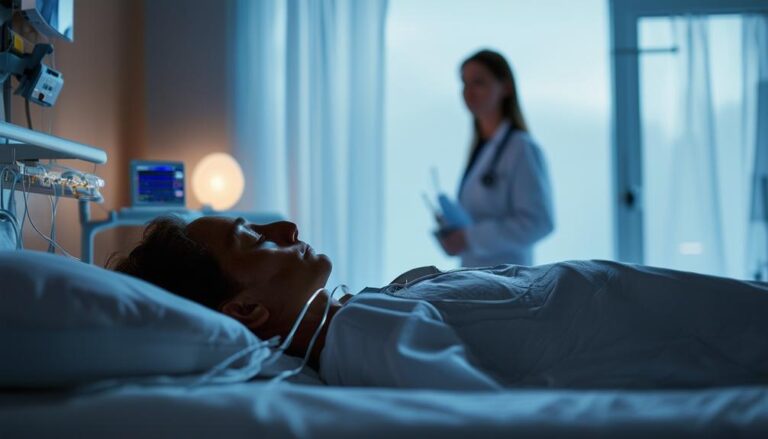Sleep Test Near Me
You can find advanced sleep labs nearby that utilize state-of-the-art equipment to monitor your sleep stages, breathing, and brain waves. These facilities offer thorough sleep studies and personalized consultations with sleep medicine specialists. Treatment options include CPAP therapy, custom-fit dental appliances, and medication management. For children, specialized pediatric sleep care ensures a comfortable and detailed evaluation. Integrated multidisciplinary teams provide holistic care plans to address your specific needs. If you're experiencing symptoms of sleep apnea like excessive daytime sleepiness or loud snoring, a detailed diagnostic evaluation will be conducted to identify the best treatment for you. Discover more about personalized sleep care.
Noteworthy Details
- State-of-the-art sleep labs recording sleep stages, breathing patterns, and brain waves.
- Expert consultations providing personalized care plans and thorough evaluations.
- Comprehensive treatment options including CPAP therapy, medications, and custom-fit dental appliances.
- Pediatric sleep care with child-friendly environments and advanced diagnostic tools.
- Collaborative care integrating multidisciplinary expertise for holistic treatment plans.
High-Tech Sleep Labs
High-tech sleep labs employ state-of-the-art equipment to meticulously record your sleep stages, breathing patterns, and brain waves, ensuring a thorough analysis of your sleep health. When you or your child undergoes a sleep study in one of these advanced facilities, every aspect of your sleep is scrutinized to diagnose any underlying sleep disorders. The process involves a thorough evaluation where physical examinations and detailed sleep interview questionnaires are used alongside the overnight sleep studies.
These sleep labs are equipped with comfortable suites designed to make your stay as pleasant as possible. Each suite includes private bathrooms, showers, Wi-Fi, TV, and individually controlled heat and air. For children, the facilities are tailored with custom-built amenities to cater to their specific needs, ensuring they feel secure and comfortable throughout the study.
Addressing sleep disorders in children requires specialized attention, and these high-tech sleep labs provide a conducive environment for such care. The collaborative approach encompasses a multidisciplinary team including experts in pulmonary medicine, pediatric pulmonology, and sleep medicine. This team works together to offer a detailed and precise diagnosis, paving the way for effective treatment plans.
Expert Consultation
When seeking expert consultation, you'll collaborate with sleep medicine specialists who will tailor a personalized care plan to address your specific sleep disorders. These experts often have completed a Sleep Medicine Fellowship, equipping them with in-depth knowledge to diagnose and treat a wide range of sleep issues. During your consultation, you'll discuss your apnea symptoms, sleep patterns, and overall health.
Here's what you can expect:
| Service | Description |
|---|---|
| Comprehensive Evaluation | Detailed assessment of sleep history and patterns. |
| CPAP Education | Guidance on using Continuous Positive Airway Pressure for apnea. |
| Behavioral Therapy | Techniques to improve sleep hygiene and behavior. |
| Medication Management | Recommendations for medications if necessary. |
You'll work with a multidisciplinary team, including pulmonologists, neurologists, and psychologists, ensuring a holistic approach to your care. This team-based strategy allows for a precise, individualized treatment plan that addresses all facets of your sleep health.
Treatment Options
There are several effective treatment options for sleep disorders, including medications, CPAP therapy, and custom-fit dental appliances.
If you're dealing with sleep apnea, Continuous Positive Airway Pressure (CPAP) therapy is often the go-to solution. CPAP machines deliver a steady stream of air through a mask, keeping your airways open during sleep and greatly enhancing your breathing.
Medications can also be part of your treatment plan, targeting specific issues like insomnia or restless legs syndrome. Your healthcare provider might prescribe sleep aids or other medications to help regulate your sleep cycle.
Custom-fit dental appliances are another viable option, especially for those who suffer from snoring or mild to moderate sleep apnea. These devices adjust the position of your jaw and tongue to keep your airway open.
Behavioral therapies, such as sleep restriction and relaxation therapy, can also be incredibly effective. Sleep restriction strategies condense your sleep into sequential nighttime hours for better rest quality, while relaxation techniques help reduce the anxiety that often exacerbates sleep disorders.
Biofeedback and education are essential components, empowering you with the knowledge and tools to manage your condition.
Pediatric Care
Pediatric care in sleep labs offers specialized, child-friendly environments equipped with custom-built amenities to guarantee a comfortable and effective evaluation of sleep disorders in children.
Pediatric sleep disorders, such as obstructive sleep apnea and insomnia, require precise diagnosis and targeted treatment approaches. In these sleep labs, your child will find custom-built beds and bathrooms designed to make the experience less intimidating and more comfortable.
Behavioral sleep medicine experts are on hand to consult with you about your child's specific sleep issues. They utilize advanced diagnostic tools and techniques to identify the root causes of pediatric sleep disorders.
After the evaluation, specialists in pediatric sleep medicine will develop thorough care plans tailored to your child's unique needs. These plans often include a combination of behavioral interventions, lifestyle changes, and sometimes medical treatment to improve sleep quality and overall health.
It's essential for a parent or legal guardian to be present during the evaluation and treatment process, ensuring that your child feels secure and supported.
Collaborative Care Approach
By integrating expertise from cardiology, otolaryngology, neurology, and psychiatry, our collaborative care approach guarantees you receive a thorough, individualized treatment plan for your sleep disorder. Sleep medicine specialists lead this multidisciplinary team to make sure that every aspect of your condition is meticulously evaluated and addressed.
Our collaborative care approach involves a series of extensive sleep studies tailored to your specific symptoms and medical history. These studies help pinpoint the underlying causes of your sleep issues, whether they're related to cardiac function, neurological anomalies, or ENT (ear, nose, and throat) complications. With input from top cardiologists, neurologists, and otolaryngologists, we can develop a more precise diagnosis and effective treatment regimen.
We emphasize a holistic treatment plan that includes education on sleep hygiene, behavioral therapy, and appropriate medications. Each patient's care plan is unique, reflecting their specific needs and conditions. This personalized attention makes certain that every angle of your sleep disorder is addressed, promoting better health outcomes and improved quality of life.
Understanding Sleep Apnea
Understanding sleep apnea involves recognizing its causes, such as obesity and anatomical abnormalities, and identifying risk factors like age and family history.
You'll notice symptoms like excessive daytime sleepiness, frequent snoring, and headaches.
To confirm a diagnosis, a thorough sleep study, often conducted in a clinical setting, is essential for tailoring the right treatment plan.
Causes and Risk Factors
Sleep apnea, often resulting from the relaxation of throat muscles, poses significant health risks that are influenced by various causes and risk factors you should be aware of.
First, understanding the types of sleep and how they affect your airway is vital. During the deeper stages of sleep, such as REM, your throat muscles relax more, potentially narrowing or closing your airway and disrupting your breathing.
Obesity is a major risk factor, as excess weight can lead to fatty deposits around your upper airway. As you age, your risk increases due to changes in your muscle tone and airway structure. Men are more likely to develop sleep apnea than women, partly due to differences in airway anatomy. A family history of sleep apnea can also increase your risk.
Certain lifestyle choices and medical conditions further contribute to sleep apnea. Smoking and alcohol consumption can relax the muscles in your throat. Nasal congestion, whether from allergies or anatomical factors, can obstruct your airway. Conditions like hypertension and diabetes are frequently linked to this disorder, necessitating consultation with an Internal Medicine specialist.
Identifying these causes and risk factors is essential for effective diagnosis and treatment, helping you improve your overall health and quality of life.
Common Symptoms Identified
You'll often notice excessive daytime sleepiness as one of the primary symptoms of sleep apnea, severely impacting your daily functioning and alertness. This persistent fatigue can make it difficult to concentrate, work, or even safely operate a vehicle. Another hallmark symptom of sleep apnea is loud and frequent snoring, which often disturbs both your sleep and that of your bed partner.
Additionally, gastrointestinal reflux (GI reflux) can be exacerbated by sleep apnea, as the changes in breathing patterns during sleep disrupt normal digestive processes. Morning headaches are another common complaint, typically resulting from the poor sleep quality and intermittent oxygen deprivation caused by sleep apnea.
Here's a quick overview of common symptoms of sleep apnea:
| Symptom | Description | Impact |
|---|---|---|
| Excessive Daytime Sleepiness | Feeling unusually sleepy during the day | Affects work, driving, and daily activities |
| Loud, Persistent Snoring | Frequent, loud snoring | Disrupts sleep for you and your partner |
| Morning Headaches | Headaches upon waking | Indicates poor overnight oxygenation |
Diagnostic Evaluation Process
How does one accurately diagnose sleep apnea?
The diagnostic evaluation process typically begins with a physical examination and a thorough sleep interview questionnaire. This initial step helps gather key information about your sleep patterns, medical history, and potential risk factors.
Next, you'll likely undergo an overnight sleep study, also known as polysomnography, in a state-of-the-art sleep lab. During this study, specialists record various parameters such as sleep stages, breathing patterns, and brain waves. These measurements provide a detailed picture of your sleep architecture and help identify any breathing interruptions, known as apneic events, that occur during sleep.
For children, it's mandatory for a parent or legal guardian to accompany them throughout the evaluation process, ensuring their comfort and safety.
Based on the results of your overnight sleep study, specialists may recommend Continuous Positive Airway Pressure (CPAP) therapy if sleep apnea is confirmed.
CPAP therapy involves using a machine that delivers a steady flow of air through a mask, keeping your airways open and preventing apneic events. This treatment is highly effective in managing sleep apnea and reducing associated health risks, such as cardiovascular issues and daytime fatigue.
Understanding and undergoing the diagnostic evaluation process is essential for accurate diagnosis and effective management of sleep apnea.
Frequently Asked Questions
How Much Is a Sleep Disorder Test?
A sleep disorder test costs $500 to $3,000. Cost comparison shows home tests are cheaper, $150 to $500. Insurance coverage can reduce expenses. Clinics offer affordability options like financing and payment plans to help patients manage costs.
Are Sleep Tests Worth It?
Absolutely, sleep tests are worth it. Despite the initial cost, their accuracy rates and impact on treatment for disorders like sleep apnea make them cost-effective. They provide valuable data aiding in personalized treatment plans and overall health improvement.
How Many Hours of Sleep Do You Need for a Sleep Test?
For best sleep quality and accurate results, you need around 6-8 hours of sleep for a sleep test. Sleep deprivation impacts the test's effectiveness, so follow the recommended hours for your age group to avoid consequences.
Can You Do a Sleep Test at Home?
Yes, you can do a sleep test at home. Home vs clinic options offer convenience, but DIY options might raise accuracy concerns. Home sleep tests can diagnose disorders, but some cases require in-lab study for precise results.
Conclusion
Beginning your journey to improved sleep, you'll uncover state-of-the-art sleep labs equipped with cutting-edge technology. Expert consultations will guide you through personalized treatment options, guaranteeing you receive the specialized care you require.
Pediatric services make certain your young ones are also in good hands. Our collaborative care approach means you're never on your own; comprehending sleep apnea has never been simpler.
So, take the initial step and wake up to a brighter, more restful tomorrow.


